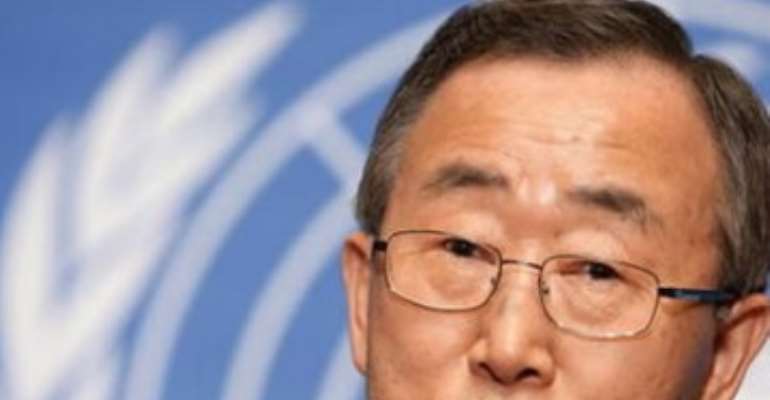Defusing global tension, averting war – Punch

Contemporary events around the world are raising concerns among statesmen. From Eastern Europe to Asia, Africa to the Middle-East, restiveness, diplomatic spats and occasional provocations between nations point to rising tension around the world and fears of a major conflagration. World leaders need to rein in passions and defuse the numerous ticking time bombs that threaten humanity today.
The signs of potential conflict are visible everywhere. In Asia, a rising and increasingly assertive China is laying claims to maritime territory and making its neighbours nervous. Its claims to oil and gas-rich islands, reefs and outcrops in the South China Sea and the East China Sea pit it against Japan, South Korea, Vietnam, Taiwan, Brunei, the Philippines and Malaysia. In dispute also are the Spratly Islands, the Paracel Islands and strategic shipping lanes. China's unilateral declaration of an exclusive flying zone and extension of its Exclusive Economic Zone, have brought the United States and its allies into the fray. While other Asian nations dispute China's ambitions as infringing on their own possessions, the US, which seeks to maintain its own ambitions as an Asia-Pacific power, has described China's claims as illegal and violations of international law and given support to its Asian allies.
Besides, the US is bound by treaty to defend the territorial integrity of South Korea, Japan and Taiwan and has recently been welcomed back to reopen a naval base in the Philippines.
In Europe, Russia's troublemaking in Ukraine, where it has recently annexed Crimea and backed separatists, has reset the world into the Cold War-like era of Russia (rump of the defunct Soviet Union) versus the US-led North Atlantic Treaty Organisation countries. The West has imposed sanctions on Russia, which has also retaliated and denied the US of further use of its International Space Station.
Already, incidents involving ships and warplanes of the belligerents are increasing in the China seas, the Baltic Sea and the Black Sea: a single miscalculation could lead to war. The danger is that many nations could be sucked into the vortex. It is time then for leaders to move nations away from hostile intent and seek peaceful resolution of the various conflicts. The United Nations should be strengthened to mediate in disputes and the major powers, especially, should stop undermining the international system by unilateral actions.
The urgency is underscored by the activities of the usual suspects âˆ' belligerents in the Middle-East âˆ' and by the sheer power and volume of armaments stockpiled in the world today. With no peace deal in sight between Israel and the Palestinians, and with a formidably armed Hezbollah militia in Lebanon, backed by Iran, which is close to making a nuclear bomb, the world can ill-afford an East-West confrontation at this time. Instead, the two blocs should be collaborating to revive the global economy, crush terrorism, which spares no one, keep the peace in the Middle-East and clean up the polluted earth.
There is a need to rekindle hopes of a unipolar world that emerged after the collapse of communism in 1989/91. The International Institute of Strategic Studies, London, estimates that, globally, $1.5 trillion is spent each year on armaments, some 2.7 per cent of the global Gross Domestic Product. A lively and troubling arms race is on with pacifist Japan, South Korea, Taiwan and Philippines now spending more on defence to fend off Chinese aggression. China itself, according to a US military assessment, spent $145 billion in 2013 to modernise its military, while the US spent $640 billion in the same year. South Korea, in response to North Korea's sabre-rattling and advanced weapons testing, spent $33.9 billion on defence last year, while the North continues its 'military first' policy, by which defence gets priority over all else in the secretive state.
World leaders should realise that we have a common interest in making the world safe from terrorism, environmental degradation, poverty and crime. These put a strain on all, creating refugee problems, insecurity and disease. In 2011, about 4.3 million persons were forcibly displaced, according to the United Nations High Commissioner for Refugees, of which about 800,000 fled their own countries.
The major powers should stop undermining the UN and seek ways to corral the 875 million small arms said to be in circulation worldwide by the Small Arms Survey. Rivalries should be put aside and action stepped up on the various arms control treaties and conventions. Stopping any other country from joining the nuclear arms club should be a priority. China and Russia should join the US in efforts to dissuade Iran from acquiring a nuclear weapon and efforts made to persuade Israel, India and Pakistan to give up theirs as South Africa did after apartheid rule collapsed.
Assertiveness and militarism by China and Russia, both seeking dominance and lost glory, hark ominously to the periods before the two world wars when Germany, Japan and Italy sought to right perceived wrongs and reinvent old empires. The parallels are not so far-fetched when juxtaposed with events in the China seas and Crimea, coupled with the danger of extremists gaining access to Pakistan's nuclear arsenal, and the willingness of the regime and rebels to use chemical and biological weapons in Syria.
Uniting to fight terrorism, a greater threat to the world, is therefore, more important than incinerating the earth over a clutch of rocks in the sea. Today's leaders should do all in their power to avoid war.
